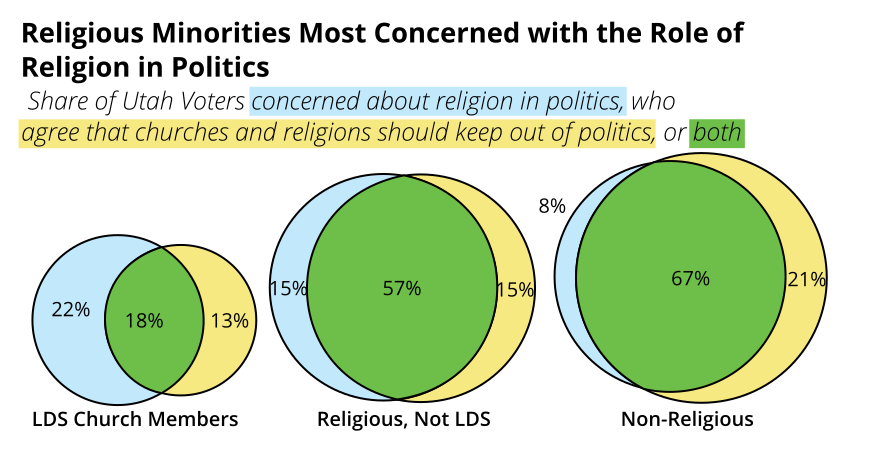This post continues our blog series on concerns that many Utah voters expressed in our survey that didn’t make the cut for our top ten list.
Utah is a unique place. Some of what makes it unique – being very Republican, being young, and having strict liquor laws – stem from one fact: around 60% of Utahns identify as members of the Church of Jesus Christ of Latter-day Saints (LDS Church).1 There are no comparable cases in the rest of the United States which such a large, concentrated block of adherents to a single religion. Just as the LDS Church affects nearly every other aspect of Utah’s society, it has a large impact on Utah’s politics where 80% of the state legislators are members of the LDS Church.
The LDS Church holds an interesting role in Utah politics. While it encourages its members to be active in politics, it rarely addresses legislation.2 Nor does it endorse specific candidates such as churches in the Pulpit Freedom Sunday movement. Yet with such a large share of the voter base, and such a large percentage of state legislators identifying with the LDS Church, it undoubtedly has a substantial effect on the way politics have developed Utah (as evidenced perhaps most clearly by current and historical liquor laws).
Respondents to the 2016 Utah Priorities Project survey who did not belong to the religious majority tended to be more concerned about religion in politics. Only 40% of those who identified with the LDS church were concerned (responding at a four or five on a five-point scale) while 72% of other religious groups and 75% of non-religious individuals were concerned.

Even with the LDS Church rarely becoming actively involved in Utah politics, it is the nature of democracy that the values of the majority of voters are reflected in the laws and policies enacted. That is the way democracies are designed to function. At the same time, it is understandable that other religious and non-religious individuals would be somewhat concerned about the role of religion in politics when a single institution has such influence over the values of a majority of Utahns.
- ^Based on Utah Foundation’s past two statewide surveys of 2150 Utahns
- ^ While the LDS Church has a stance of political neutrality, there are currently seven active lobbyists registered with the LDS Church by the State of Utah
Categories:

